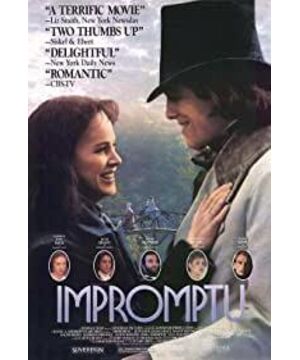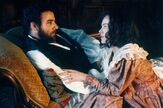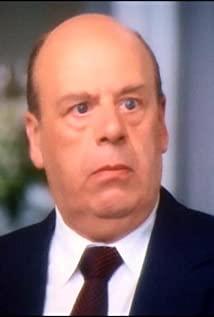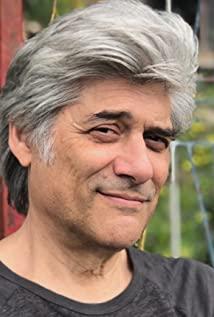watching "An Unforgettable Song", I was really shocked. Because this kind of typical distorted characters with a high-spirited revolutionary tone and Gao Daquan is really more like a replica of the concept of the main theme movie of the Celestial Dynasty, it can't help but make me suspect that the director and screenwriter have comprehensively studied and understood the main idea of class struggle. . The entire context of the film is old-fashioned and distorted to the point of absurdity, unrestrictedly exalting certain spirits in ideology, and the lines of a slogan idealist declaration. When I saw Chopin's revolutionary consciousness in the beginning of childhood, I lived in the upper abdominal cavity under the diaphragm. The organs in charge of digestive function have been slightly uncomfortable and awkward. . . As for the male protagonist Chopin's children's shoes, it is more like a revolutionary protagonist from a country in Eastern Europe that used to be in the socialist camp-sorry, I don't mean to belittle, I mean he would be better when he plays other people--ahhh , For example, you can refer to some of the characters in Monkhaki's painting "Death Row". Forgive my deep aversion to such forms, I think the so-called "works of art" in that area at that time are really hard to match, and the value of serving—or using—the leadership of a certain love representing the whole is far from being worthwhile. Much higher than that "art" content. Chopin's children's shoes in the movie, it would be more appropriate to play a little literary Cossack similar to Pugachev's men... And Chopin's half-French blood and half-aristocratic blood should have the elegance in This revolutionary literary film was beautifully ruined. . . As for the character of George Sang, who is really an old grumpy woman, it really ruined all the natural temperament and characteristics that Sang should have... Another thing that cannot be tolerated is that the overall costume modeling and environment framing are more like the period of the Civil War. America, without some of the aristocratic atmosphere of 19th-century French salons—nothing, the splendid feasts and reluctant salon vibes that have been piled up, can only make people feel stereotyped and comical.
"Spring Sonata" is not so much a biographical film of the composer, but more of a hilarious twist for Chopin and George Sand, two of the most story-telling couples in the 19th century literary salon. A gimmicky fictional story. But looking at the comparison, I think the latter is more close to that feeling-although the plot is fictional, but the characteristics of the two characters are quite reasonable~ The music is very well matched, and it is reflected in all the details of the development~ I personally I really like the prelude they used to pass each other for the first time, it feels really appropriate; as for the other scherer jokes and soundtracks, I won't go into details ~ the hero and heroine are also closer to the imagined image ~ Hugh Grant who plays Chopin It was at a good age (that was him in 1991, look for a recent photo, otherwise he would beat the ground), and even admitted that when he saw the handsome, delicate and handsome Chopin in the movies in the 90s, he was fascinated by the clouds~ As for George •Sang - All I can say is that Judy Davis has really tapped into Sang's double-sided character better than the old grudge. But the most important thing is that, at least for me, the differences between the two are secondary; what I focus on is more of an incomparable era - a literary and art full of diverse emotions The era of divergent thinking, vibrant, ideal and most unrealistic romanticism.
The screenwriter has only developed to the beginning of the relationship between the two, and it ended before going to Mallorca. This is a very complete ending. The story ends just right. It always ends with a seemingly happy ending, but few people can think of the sadness of the fate that will continue to develop. The reality itself is flawed, and perhaps it is a blessing to ignore it before the final sorrow comes.
There is fiction in movies, and in comparison, the fiction of "Spring Sonata" is not as unbearable as the former. Maybe Impromptu's design is closer to what it should express - or rather, nature. Instead of wantonly elevating the "revolutionary" kind of vagueness, and the customary attributive of a certain character with a label. For example, I am very disgusted to use labels such as "patriotic" to advertise the characteristics of artists - sorry, the political consciousness of artists may disappoint everyone, especially those who have high expectations and are eager to serve them. Disappointed. It is not that this kind of consciousness is completely excluded, but this consciousness will eventually be transformed into the emotion of creation, rather than the main thought that controls art. It's a question of who serves whom. He is just to express his inner emotions, which is more monologue. When an artist expresses artistic emotion, it is nothing more than what he wants to express, he feels that he should express it, he is exhausted, he is excited, he has desires, he writes and draws them, condenses them into a finished product to vent his emotions, and that's it. As for whether future generations think it is good or bad, it has nothing to do with him in essence. What he loves is his inner state. Therefore, the so-called patriotism is better to say that he is the homeland of the attachment soul. The kingdom belongs to him alone. As for those slogan-like forms, they want to use the name of art to raise their own worth - sorry, where did you come from and where did you go back.
View more about Impromptu reviews











